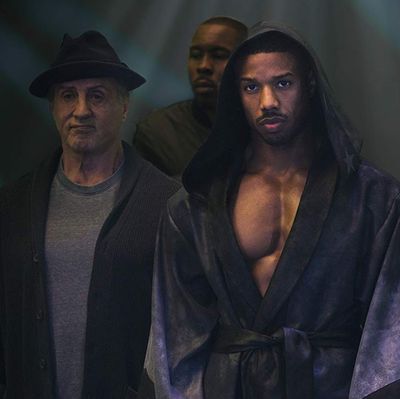
Can lightning strike twice? It’s understandable that Creed II might be greeted with unfairly huge expectations. With 2015’s Creed, Ryan Coogler reinvented a moribund franchise by following the lineage of a secondary character instead of the series’ hero; the shift of focus to Adonis “Creed” Johnson, the son of Rocky Balboa’s one-time rival and dearly departed pal Apollo Creed, basically allowed us to forget that the movie was a Rocky sequel. Creed II, directed by Steven Caple, Jr., however, reminds us of it at every turn. But in some ways, it works better as a Rocky sequel than it does as a Creed sequel.
The film strikes an odd tone right from the beginning, as it opens in a gloomy corner of Kiev, Ukraine, where we see the once mighty Ivan Drago (Dolph Lundgren), the former Soviet superstar whom Rocky Balboa defeated in Rocky IV, going for an early morning run with his son Viktor (Florian “Big Nasty” Munteanu) through a concrete wasteland. The mood is one of bleakness and sadness instead of menace; their run-down little flat has family pictures lying around and little else. For those familiar with the iconography of the Rocky series, it’s jarring to see the once robotic, indestructible Drago reduced to a state of pathetic, impoverished anonymity.
Meanwhile, our hero Adonis “Creed” Johnson (Michael B. Jordan), is in another world entirely, preparing for a big title bout for the world light heavyweight championship. We’re introduced to him this time via a long, fluid tracking shot following his girlfriend Bianca (Tessa Thompson) backstage at the big fight, as she finds him in the locker room, nervously getting ready. We see the swirl of activity around Adonis, the pressure and maybe even the doubt looming over him. As various announcers helpfully remind us throughout the movie (“It all feels so Shakespearean!” one observes), Adonis still wrestles with the enormous legacy of his father, legendary champ Apollo Creed, who was killed in the ring by Ivan Drago before Adonis was even born.
The contrast between Adonis, surrounded by his people and bathed in adulation, and Viktor Drago, a lonesome bruiser raised in regret and shame, couldn’t be starker. And that’s where Creed II gets interesting, because the Dragos remain, over the course of the film, a pair of emotional underdogs; we feel terrible for them. Even when the fighters’ circumstances are somewhat reversed, and the Dragos find themselves suddenly back in the spotlight, wined and dined by the Russian elite, they remain a lonely, mopey father-son duo, with a surprisingly tender bond. They seem distinctly aware that all this glory is fleeting.
The movie also gets at something poignant with its depiction of the solitude of boxing. As much as fighters may surround themselves with their loved ones, and as loyal as their family and friends may be, in the end it’s still the fighters getting beaten to a pulp out there, and the film mines some genuine feeling from that. “It’s only three steps into that ring,” Stallone’s Rocky says at one point, before calling it “the loneliest place in the world.” That’s one of his better lines, actually. Most of his other observations are hopelessly stale and overwritten. The actor actually got an Oscar nomination for Creed, but he had to fight cancer in that one. Here, he mostly wanders around spouting sentimental clichés, without anything particularly compelling to do.
Creed II is pretty rough around the edges, in a way that the blisteringly confident and unexpectedly stylized Creed was not. The fight scenes are more functional than anything else, lacking the previous film’s inventive camerawork. This time, we linger on photos of the glorious past approximately 823 times. There are a few too many speeches about legacies and parents and children. Key moments are telegraphed a bit too heavily. Most of the picture seems to consist of montages (which, hellooo, Rocky movie) but luckily they’re pretty entertaining ones.
And it does land some solid punches. While it’s broadly predictable in all the usual ways, Creed II admirably toys with our emotional allegiances just enough that we’re not always sure of how we feel about where it’s all headed. Besides the absorbing depiction of the Dragos’ journey, there are also some touching moments between Adonis and Bianca, as they mull the next step in their relationship. But these scenes work mostly thanks to the work Coogler’s earlier film put into defining the characters. And it’ll be interesting to see how the legacy of Creed affects Creed II’s reception. Go in expecting greatness, and you’re likely to be disappointed. Go in expecting a Rocky sequel, and you’ll get a surprisingly effective one.


